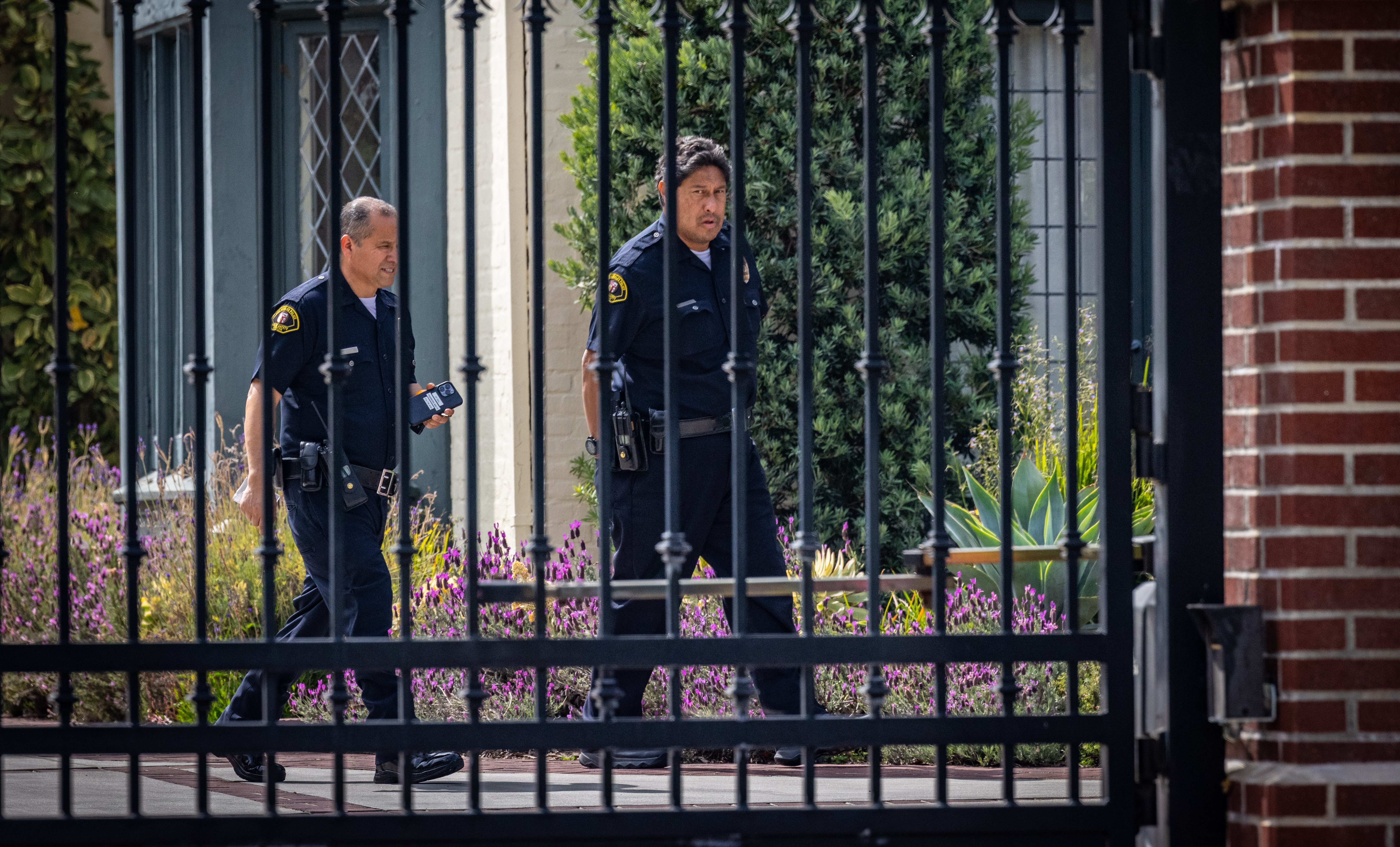Cardinal Roger Mahony, who retired with a tainted career after dodging criminal charges over how he handled pedophile priests, was stripped of his archdiocese duties in an unprecedented move by his successor, who described the actions by abusive priests in the files as evil.
It wasn't clear whether the Vatican supported Archbishop Jose Gomez's decision to publicly criticize a fellow priest and colleague in the Roman Catholic Archdiocese of Los Angeles. The announcement was seen as long overdue by victims and surprising to church experts who said it was unusual for an archbishop to take action against a higher up.
One local survivors' group representative said Friday that he was not satisfied with the actions, calling them "window dressing."
Gomez's move came as the church was legally forced to release thousands of confidential files on pedophile priests -- and two weeks after other long-secret priest personnel records showed Mahony worked with top aides to protect the church from the engulfing scandal.
One of those aides, then-Monsignor Thomas Curry stepped down Thursday as auxiliary bishop in the Los Angeles archdiocese's Santa Barbara region. Gomez said Mahony, 76, would no longer have administrative or public duties in the diocese. It didn't appear that Gomez's actions would affect Mahony's position in Rome, where he can remain for another four years on a counsel that selects the Pope.
"I find these files to be brutal and painful reading,'' Gomez said in a statement, referring to 12,000 pages of files the church posted online Thursday night just hours after a judge's order. "The behavior described in these files is terribly sad and evil. There is no excuse, no explaining away what happened to these children.''
Archbishop Gomez's Full Letter (PDF): English | Spanish
On Friday, Mahony posted on his blog a letter he had sent to Gomez that day.
"Nothing in my own background or education equipped me to deal with this grave problem," he wrote.
Mahony recounted the evolution of the archdiocese's approach to sexual abuse by priests. He noted that when Gomez became archbishop in 2011, the archdiocese leader was involved in the most recent of a series of audits that inspected clergy conduct.
"Not once over these past years did you ever raise any questions about our policies, practices, or procedures in dealing with the problem of clergy sexual misconduct involving minors," Mahony wrote to Gomez.
"I have stated time and time again that I made mistakes, especially in the mid-1980s. I apologized for those mistakes, and committed myself to make certain that the Archdiocese was safe for everyone.
Local
Get Los Angeles's latest local news on crime, entertainment, weather, schools, COVID, cost of living and more. Here's your go-to source for today's LA news.
"Unfortunately, I cannot return now to the 1980s and reverse actions and decisions made then. But when I retired as the active Archbishop, I handed over to you an Archdiocese that was second to none in protecting children and youth," Mahony concluded.
The fallout was highly unusual and marks a dramatic shift from the days when members of the church hierarchy emerged largely unscathed despite the roles they played in covering up clergy sex abuse, said the Rev. Thomas Reese, a Jesuit and senior fellow at the Woodstock Theological Center at Georgetown University.
"It's quite extraordinary. I don't think anything like this has happened before,'' Reese said. "It's showing that there are consequences now to mismanaging the sex abuse crisis.''
In an email, U.S. canon lawyer Nicholas Cafardi said Gomez was acting within his authority in preventing Mahony from having any public duties in the archdiocese.
"Basically, only the Holy See can sanction a cardinal,'' he said. `"It is fair to say that Gomez' authority only runs to the limits of the archdiocese.
"Still, do not underestimate the importance of one bishop publicly criticizing another. That is huge.''
But a clergy abuse victims' group is not satisfied with actions taken against Cardinal Roger Mahony.
Standing Friday in front of the Cathedral of Our Lady of the Angels, a regional director of the Survivors Network of those Abused by Priests called Gomez's actions "window dressing.''
Joelle Casteix said the move is only symbolic, and Mahony is still a powerful man in Rome and Los Angeles.
Mahony has repeatedly publicly apologized for mistakes he made in dealing with priests who molested children. He retired in 2011.
Several of the documents released late Thursday echo recurring themes that emerged over the past decade in dioceses nationwide, where church leaders moved problem priests between parishes and didn't call the police.
In one instance, a draft of a plan with Mahony's name on it calls for sending a molester priest to his native Spain for a minimum of seven years, paying him $400 a month and offering health insurance. In return, the cardinal would agree to write the Vatican and ask them to cancel his excommunication.
It was unclear whether the proposed agreement was enacted with the Rev. Jose Ugarte, who had been reported to the archdiocese 20 years earlier by a physician for drugging and raping a boy in a hotel in Ensenada, his file shows.
"He has been sexually involved with three young men in addition to the original allegations,'' Curry, then Mahony's point person for dealing with suspected priests, wrote in 1993.
In another case, Mahony resisted turning over a list of altar boys to police who were investigating claims against a visiting Mexican priest who was later determined to have molested 26 boys during a 10-month stint in Los Angeles.
"We cannot give such a list for no cause whatsoever,'' he wrote on a January 1988 memo.
Mahony, who retired in 2011 after more than a quarter-century at the helm of the archdiocese, has publicly apologized for mistakes he made in dealing with priests who molested children.
He has survived three grand jury investigations and several depositions by civil attorneys representing alleged abuse victims.
Prosecutors, who have been stymied for years in their attempts to see the internal church files, have said they will search for new evidence of criminal wrongdoing by church leaders. Most of the material, however, now falls well outside the statute of limitations.
Los Angeles Superior Court Judge Emilie Elias ordered the diocese to turn over the files Thursday without blacking out the names of top church officials who were responsible for handling the priests.
The judge gave the archdiocese until Feb. 22 to turn over the files, but they were released less than an hour after she signed the order.
While the church left the names of church leaders intact, as specified, they removed names of victims, witnesses and priests who weren't accused. In some instances, whole sections were removed.
The church said in a statement that the files' release "concludes a sad and shameful chapter in the history of our local church.''
The archdiocese, the nation's largest with 4.3 million members, had planned to black out the names of members of the hierarchy who were responsible for the priests, and instead provide a cover sheet for each priest's file, listing the names of top officials who handled that case. The church reversed course Wednesday after The Associated Press, the Los Angeles Times and plaintiff attorneys objected.
A record-breaking $660 million settlement in 2007 with more than 500 alleged victims paved the way for the ultimate disclosure, but the archdiocese and individual priests fought to keep them secret for more than five years.
Some church critics said Gomez's actions, particularly against Mahony, amounted to a slap on the wrist as long as he remained a cardinal and a member of the powerful Vatican body that elects the Pope.
The reprimand is a "purely symbolic punishment that they hope will satisfy at least some people in the archdiocese,'' said Terry McKiernan, founder of BishopAccountability.org, which tracks the release of priest files nationally.
"I don't think that many savvy observers of this will be deceived.''
Associated Press Writer Shaya Tayefe Mohajer and NBC4's Melissa Pamer contributed to this report.



